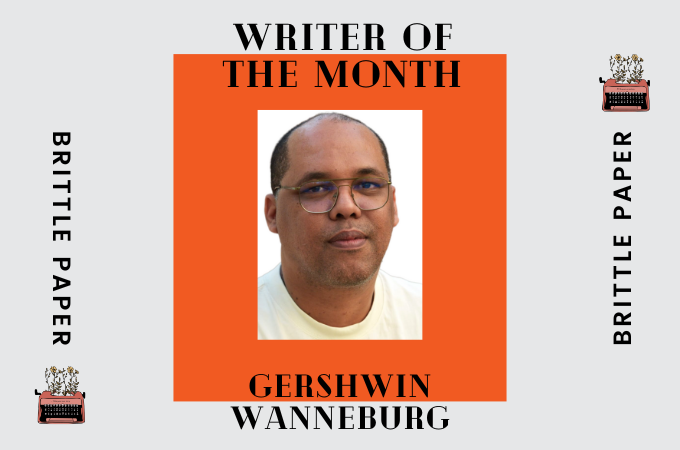
Brittle Paper’s Writer of the Month for May is Gershwin Wanneburg!
Gershwin Wanneburg is a South African writer and editor who strives to write in a voice that is uniquely African, unquestionably Cape Townian, and subversively and joyously queer. As a child of apartheid and colonialism, and also the multiple lineages that found themselves stranded on the southern tip of Africa, his work is founded on his need to be in service to the community that, in turn, empowers and outrages him.
He has worked as a journalist and communications professional for several local and international organisations, including public broadcaster SABC, private TV channel eNCA, Reuters news agency, and the African Development Bank. Apart from his journalistic endeavours, he has a novel manuscript called Bintou and is currently working on a collection of short stories based on his time in West Africa, with the working title Goodbye, Abidjan.
After publishing his story, “Missing,” we needed to know more about this incredible writer. So, grab a drink of your choice and get into this brilliant conversation with Gershwin Wanneburg!
Brittle Paper
Gershwin, congratulations on being May Writer of the Month! Your piece “Missing” stuck with me and it is the reason why it’s my April standout. It was emotional and dark, but mainly, for me as a Cape Malay girl from Cape Town, it painted a very vivid image of the environment. I will share more thoughts on it later but let’s start with who Gershwin Wanneburg is.
What made you want to be a writer? Is it passion or are you one of those reluctant writers who feel obliged to pick the pen up because the stories find them?
Gershwin Wanneburg
Thanks so much. I’m so grateful that you thought my work was worth highlighting. I’m genuinely pleased, not only personally, but also for the people whose lives I tried to pay tribute to in “Missing”.
My fascination with stories probably stems from my childhood. I recall the bedtime stories my mother, a primary school teacher, told me, and how she told those stories with such relish, using different voices to portray the characters. When it comes to sheer word-joy, I probably inherited that from my father, who I know very little about. I’ve been told that, in addition to being a full-time language teacher, he wrote for various newspapers, and taught German in his spare time. Other than that, for as long as I can remember, I have been in awe of language and what writers do with it.
Brittle Paper
I think people underestimate the deep long-lasting impact that exposure to language and stories can have on children. If you create an environment that shows the power and joy found in words, you are not only entertaining a child but also providing them with tools to help them represent themselves through every stage of their lives, especially the difficult stages.
Gershwin Wanneburg
Very much that because for me, growing up, books were my best friends. I suspect that childhood trauma also played some kind of a role in my retreat to books and the world of my imagination. I often found myself wishing that people in real life could express themselves the way characters did in books through their inner monologues.
I have to say though that, given my working-class background, I never entertained the idea of being a full-time fiction writer. But the next best thing was to become a journalist. It assured me of a creative outlet, plus a career and a livelihood. Part of my reluctance or resistance to the idea of being a career writer probably also had to do with the fact that I found it so daunting. I thought writers had these special imaginative powers that allowed them to magically conjure stories and lyrical sentences.
It wasn’t till I was in my late 20s or 30s, through reading about the real-life origins of Toni Morrison’s Beloved, that I discovered fiction could be based on real life. But I always told myself that writing a novel was something that had to wait until I had enough time and money set aside to dedicate myself to this lofty craft, even though I had, over the years, in spare time, or when I had the inspiration or motivation, scribbled away at a novel (still incomplete).
Then, in 2022, a friend forwarded me an ad for a short story writing competition. And all of a sudden, I had a light-bulb moment: I realised that spending years writing a novel wasn’t the only option available to me. I could squeeze off a few minutes here and there to work on a short story. The result was “Missing,” and, in the process of writing it, as the sentences kept tumbling out over a number of weeks, sometimes at odd times, mid-conversation, I realised that, maybe, just maybe, I could pull this off.
Brittle Paper
I absolutely love the insight you are giving us because it helps give us context into understanding you even more through this interview.
I feel like you and I will have plenty to discuss but before we go any further, this is my favourite part of the interview, so you need to humour me. I have a few questions about your literary loves, starting off with what your favourite book to return to is.
Gershwin Wanneburg
Oh boy, do I have to pick one? [laughs] Based on my reading track record, I would probably have to say Singin’ and Swingin’ and Gettin’ Merry like Christmas, one of the volumes of Maya Angelou’s autobiography. It is such a fun, funny read about a captivating life. And, of course, the delight that Maya Angelou takes in language is just intoxicating. To this day, I find myself dwelling on some of the sentences from that book. One of my favourite descriptions is when she talks about music being a refuge, that she could “crawl into the space between the notes and curl her back into loneliness.”
Brittle Paper
If you could have dinner with any writer, who would it be?
Gershwin Wanneburg
Toni Morrison is probably the writer whose company I have enjoyed the most, on and off the page. But, because I have read so much about her and watched so many interviews with her, maybe I should say Alice Walker. I know she is very controversial of late because of her anti-transgender views and her apparent support for a well-known anti-Semite. But there was a time I read her work obsessively. I didn’t agree with all her views (as I recall, she had a predilection for New Age philosophy) but I did find her garrulous musings fascinating, and entertaining, even. I also loved her rebelliousness. And I always found that she had a kind of innocence about her that I found very compelling. So, I suppose I would love the opportunity to ask Alice: Where did it all go wrong? Do you really hold those views about transgender people and Jewish people?
Brittle Paper
What’s the last book you read?
Gershwin Wanneburg
The last book I completed was As Meat Loves Salt by Maria McCann. It’s a thriller/gay romance novel set in 17th-century England, against the backdrop of civil war and class struggles. Aside from the many plot twists and turns, I savoured the writing, which is infused with the language of the period. My current read is a book of essays called The Toni Morrison Book Club, written by four academics who happen to be friends. It’s a great way to revisit some of her books while feeling like you are in the company of very smart, funny people.
Brittle Paper
And, if you had to recommend a South African book to our non-SA readers, what would it be?
Gershwin Wanneburg
At the moment, my South African reading recommendation would be Country of My Skull by Antjie Krog – both for non-SA’ers and SA’ers, because I feel like we are living in such an ahistorical time, filled with so much noise and people freely spewing their ignorant and damaging views on social media (which is increasingly creeping into mainstream media). Granted, there is much to make a noise about in South Africa right now, and frankly we are approaching a political transition that is quite scary. Not to mention the frightening levels of crime, poverty, unemployment, and state decay. Country of My Skull is based on Krog’s coverage of the Truth and Reconciliation Commission, which laid bare the terrible crimes that were perpetrated by the apartheid regime. The book reminds us of the horrors we have overcome – and the great ambitions we once harboured for this place dangling on the southern tip of Africa.
Brittle Paper
I think those may be the most detailed answers I have ever gotten to those questions [laughs]. I think your recommendation is brilliant, and I hope our readers take you up on it.
Now Gershwin, your April piece, “Missing” was brilliantly written and such a striking piece. My mother, who reads all of the Brittle Paper things, read “Missing” and immediately messaged to ask me if this was inspired by the *Station Strangler. My mom is a Cape Malay woman from Cape Town so those cases were and still are ingrained in her memory. I hope I am not overshadowing your inspiration behind the story by mentioning this, but it did remind me of that as well.
Were those cases a factor in the creation of this story or is this just a coincidence that occurs from living in a society like ours that often has many of these realities anyway?
Gershwin Wanneburg
Thank you so much for connecting those dots and finding something meaningful in this little story of mine. “Missing” is partly inspired by the Station Strangler era, and the very vivid childhood memories I have of the terror that those murders triggered on the Cape Flats. It is also inspired by the epidemic of missing children that seems to be endemic to this part of Cape Town. In addition, it is also based on a personal experience I had – a very terrifying narrow escape when I was kidnapped around the time of the Station Strangler. I’m not sure I ever would have written about this, had it not been for the prompt of the short story competition I entered: which was about memory. The first thing that came to mind was that experience I had as a child.
Brittle Paper
Firstly, I am deeply sorry that you had to experience something like that, especially as a child. Secondly, I am also deeply saddened by the fact that there are many who could probably resonate with this and that in itself is a daunting and terrifying reality. You also raise an urgent topic which is the epidemic we face of missing children which has never gone away in South Africa.
How do you feel about the topics and genres covered in POC, particularly coloured, South African stories? I grew up reading books for school such as Who Killed Jimmy Valentine? which was a relatable but also troubling story of the taxi wars and dangers in our communities. And when there are lighter stories, they are often intertwined with harsh backgrounds. I believe in not shying away from these realities, but I also think we need a balance.
Gershwin Wanneburg
Thank you so much for your empathy. I’m certain that there are thousands of adults out there who are dealing with those same childhood issues, consciously or unconsciously, and children who are still experiencing them every day, as we speak.
Regarding SA literature – that’s a really meaty question to tuck into, one I haven’t really considered before. I’m sure I could write a whole thesis on the topic of post-apartheid or post-democracy literature. I think we are probably approaching a combination of the two: post-lost-decade, post-state-capture, post-pandemic, post-loadshedding literature. Or maybe just, now that I think about it, gosh-we’ve-been-through-a-lot-literature. I’m being facetious, of course. But only partly. I think the prevalence of these heavy stories in our literature is probably a reflection of our history and how that has spilled into our present.
We live in a deeply troubled society, and in many ways, I think we are still trying to get to grips with our history and the contemporary ills we face. So, for that reason, those concerns will probably be reflected in our literature for a long time – and rightly so. After all, history constantly reveals itself, depending on new facts, new scholarship, etc. I’m amazed at the volume of books published each year that shed new light on even well-covered topics and historical figures, everything from Shakespeare to the Watergate scandal. Two recent South African books that come to mind are The Plot to Save South Africa by Justice Malala and The Man Who Shook the Mountains by Lesley Mofokeng, a story based on his grandfather’s life. A friend of mine, Jamil Khan, also wrote a brilliant coming-of-age memoir, Khamr, about his experiences as a young, queer Muslim man.
Brittle Paper
I think I could do a dissertation on your recommendations alone. These are some fantastic books to raise awareness of and I must admit, I know of Khan’s book, but I have yet to read it. This was a good reminder that I need to add it to my list immediately.
Gershwin Wanneburg
It just occurred to me that these past three decades of democracy were probably the first time that South Africans, Black South Africans in particular, have been so free to write whatever they like, to tell the stories they never could before, not just personal family histories, but art and literature in general. If you visit art galleries in Joburg (which I haven’t done in years) it’s staggering to see the work of the bold, brilliant young Black artists out there. It’s a renaissance of sorts. And I have a feeling it will only get better and more audacious. We will all be better for it. I find that so exciting.
Aside from that, I think that literature is something that should be given free reign—even bad or mediocre literature! Let the writers write about whatever moves them or compels them. I have to add that I do think some new voices have emerged over the past five years or so that are writing genre literature – murder mysteries and so on – I mean, it seems like there’s one in the Lifestyle section of the Sunday Times each week. I don’t read too many of those books, unfortunately, possibly because I get my entertainment fix from bad television shows or because of my journalistic background—it recently dawned on me that my reading list consists mainly of non-fiction, a lot of it books written by journalists. I probably read only three or four novels a year.
Brittle Paper
Building on your comment about writing being something that should be given free reign and writing about what moves you, what would you want to achieve through your writing?
Gershwin Wanneburg
Personally, I hope that I’m able to fill a literary gap that I’ve observed — stories about my community. Obviously, geniuses like Adam Small and Peter Snyders have written wonderfully about the people of the Cape Flats, and so have contemporary writers, especially a very dear friend of mine, Khadija Heeger, who also happens to be a fantastic actress regularly featured on SA television shows, but I feel we are still underwritten and underrepresented, which is a pity because, having dug into our history at the Cape just a little bit, I have uncovered so many incredible stories; even in my neighbourhood there are so many sagas—I mean, just operatic family dramas, and I just know that they exist in every neighbourhood on the Cape Flats—not just gang violence, but compelling human dramas about love and survival. I mean, our language alone floors me. I can spend hours just listening to the expressions, turns of phrases, which seem to evolve with every season. Yet there is this huge gap. Maybe it’s because publishers don’t think this small, marginalised community is a financially viable market. But I think South Africa is poorer for it, culturally.
Just look at the work of people like Khadija and that great, great poet Diana Ferrus, who I believe are not heralded in the way they should be. If you ask me, they should both be taught in schools, and deserve to be on postage stamps, if not money. Khadija should have been a professor emeritus of arts by now. Please, please, please, look her up. I promise. If you never read another South African poem, you must experience her performance of Citizen Minus, which has become a classic on the Cape Town literary scene. You can view that masterpiece here and find more of her work on her personal YouTube channel. She has also published two volumes of poetry, so you can binge-read her work if you’re not familiar with it. As for Diana Ferrus, there’s hardly a week I don’t think about her breath-taking poem, “I Have Come to Take You Home,” which talks about her longing for Sarah Baartman, and eventually led to the French government sending her remains back to South Africa. Can any other South African poet, or any poet anywhere, claim such an achievement?
Like Khadija and Diana, our First Ladies of Letters, I really, really I hope to write our people into history. Like the lady said, if there’s a book that you want to read, then you must write it.
Brittle Paper
Anything that reminds the world, but mainly us, of Sarah is something worth celebrating. I still get goosebumps whenever I visit UCT now that the hall is named after her. It fills me with a sad kind of pride.
You raised a phenomenal point that this is just a few years since our first democratic election. I mean, we just celebrated our 29th Freedom Day on 27 April. It is expected to have an influx of overwhelming tales of grief now that there are fewer restraints on it. You see this in the literary field as well as in your work as a journalist.
Do you find it difficult to move between the two worlds of journalistic writing and creative writing?
Gershwin Wanneburg
Hmmm… I think there are advantages and disadvantages to being a fiction-writing journalist. Because of my many years in newsrooms, I think I had an idea of what to expect when I first encountered this particular blank page for the first time. For example, I knew that it would likely be incredibly daunting. I knew that I could expect to write and rewrite and rewrite and polish and tinker…I also knew that things would start clicking into place once I got over that hurdle of the first sentence. I was also accustomed to editing my copy until it was respectable, and I felt comfortable presenting it to the world (or even just to an editor).
A major disadvantage is that, as a journalist, you can get away with cliches. In fact, you probably build your career on cliches—they are a handy fallback when you are writing on a deadline and have no time for fuss or flair. News reporting also tends to be very formulaic. You mostly know how to put together a news article (the 5 Ws and the H, the 35-word rule, the inverted pyramid, etc), especially after a decade or so in the business. But, in creative fiction writing, those rules don’t apply. In fact, those habits can hobble you. It took me lots and lots of rewriting to scrub out all the cliches and arrive at the structure that I felt worked best for this story.
Brittle Paper
With that said, you have a new piece on Friday. What can you tell our readers about Friday’s story?
Gershwin Wanneburg
The first thing that comes to mind is, the story makes me smile. Because it is based on a close friendship. Because it tested my creative abilities. I wanted to wrap so many things into that piece of writing. I wanted to write about friendship and how badly we need it in these chaotic, challenging times. In the end, I think it became about misfits – gender misfits, class misfits, social misfits. Not only do these misfits suffer through exclusion, but society suffers from their absence. We lose out on the compassion and creativity of these wonderful, oddballs when we fail to accept them.
Above all, I suppose, it’s a tribute to a queer sister who has, like me, struggled to find a home. I hope, in its own tiny way, this story provides some kind of refuge, some kind of warm place, for everyone who has felt this sense of being unwelcome—even, and perhaps especially, in the place of their birth.
Brittle Paper
I think “Not only do these misfits suffer through exclusion, but society suffers from their absence” is a striking slogan for many of the social movements we find ourselves in.
Before we go, apart from your writing, Gershwin, what is one thing about yourself that you want to share with our readers?
Gershwin Wanneburg
Apart from my writing, maybe this will be of interest. During the pandemic, I started exploring my family history a bit more. I have always wondered where this very German surname comes from. It’s quite an unusual surname in South Africa, and it feels so removed from who and what I am. But the real revelation, for me, came when I dug into my father’s history. As it happens, he also has a very German surname—Reitz. So, I have these apparent Teutonic roots from both my paternal and maternal sides, and I’m sure the history behind it holds some horrific stories. A DNA test revealed that, aside from my predominantly African and Khoi/San lineage, the European influence is much stronger than expected. My research also revealed that the Reitz family, whose name I found peppered throughout South African history, has a long history of writers, going back, as far as around 200 years.
One was a politician and poet and deputy editor of the Cape Argus, where I worked in my 20s, and had no idea of this namesake connection, at least via my father. I also discovered a well-known Wannenburgh who was a writer and activist. I have no concrete proof that these people are kin, genetically, but they definitely sound like kindred spirits. It just goes to show how many interesting—and unexpected—stories are hidden beneath the surface in South Africa.
I also hope that your readers are interested to know that I am working away at other stories – including one or two novels; one written in Afrikaans, which has for years been waiting resentfully for me to pay it some attention. If I’m lucky, I may even complete a book of poems.
And, finally, thanks again for giving my stories a platform and for indulging me even further with this opportunity to engage with your wonderful writing community. There’s nothing I love more than talking about writing!
Brittle Paper
It has been an absolute privilege. I interview a lot of my writers and I enjoy every single one of them. But I have to say that this has been my favourite! Thank you for taking the time to have a chat with me and for giving our readers more insight into Gershwin Wanneburg!
*If you’re not familiar with the Station Strangler cases, you can search for the case stories but be warned, it has triggering themes of assault and murder.
For more of Gershwin’s work, be sure to check back in on Friday, and for more interviews with our writers, check out our last month’s with Chinelo Enyinnaya here.


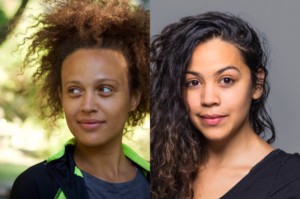
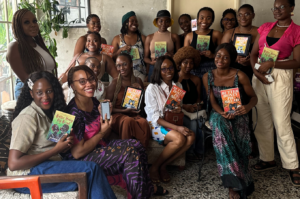
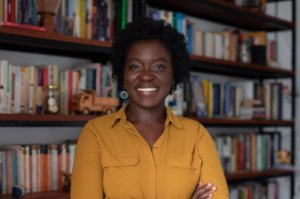
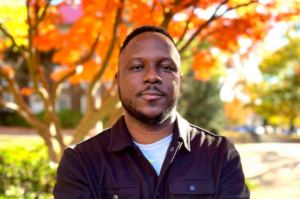

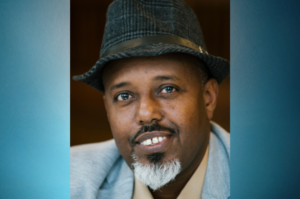

Grace Kiire May 01, 2023 13:56
This was a fantastic interview with a gem of a person. Gershwin is so deserving of this accolade and many more. It's clear from this interview and in his writing, that he is a gift to the world. Looking forward to following his journey both on and off the page.